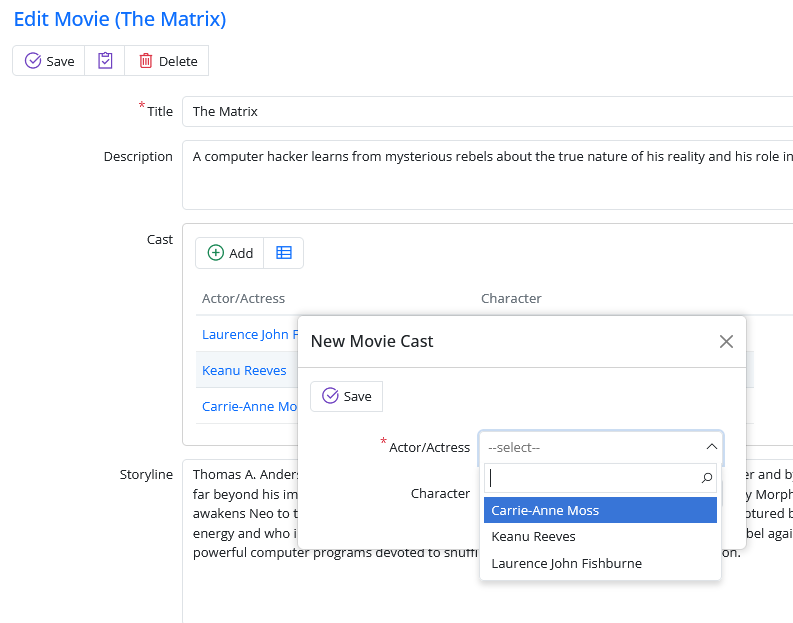Handling Lookup Scripts
Upon accessing the Movie page, tenant2 will only see movies belonging to their tenant. However, when attempting to add a cast member to a movie, all persons are displayed:

This data is provided to the script side through a dynamic script and does not utilize the List services we handled previously.
The lookup script that generates this dropdown is defined in PersonRow.cs:
namespace MovieTutorial.MovieDB;
[ConnectionKey("Default"), Module("MovieDB"), TableName("Person")]
[DisplayName("Person"), InstanceName("Person")]
[ReadPermission("Administration:General")]
[ModifyPermission("Administration:General")]
[ServiceLookupPermission("Administration:General")]
[LookupScript] // <-- This is the definition
public sealed class PersonRow : Row<PersonRow.RowFields>, IIdRow, INameRow
{
[DisplayName("Person Id"), Identity, IdProperty]
public int? PersonId { get => fields.PersonId[this]; set => fields.PersonId[this] = value; }
//...
At times, it is necessary to implement custom lookup scripts to tailor data retrieval. For example, the Northwind sample
SupplierCountryLookupclass derives from theRowLookupScriptbase class. In such instances, we must appropriately handle these types of lookups.
We should filter the lookup query by the current tenant. To facilitate this, let's create a new base class in preparation for handling additional lookup scripts in the future.
namespace MovieTutorial;
public class MultiTenantRowLookupScript<TRow> : RowLookupScript<TRow>
where TRow : class, IRow, IMultiTenantRow, new()
{
private readonly ITwoLevelCache twoLevelCache;
private readonly IUserAccessor userAccessor;
public MultiTenantRowLookupScript(ISqlConnections sqlConnections, ITwoLevelCache twoLevelCache, IUserAccessor userAccessor) : base(sqlConnections)
{
Expiration = TimeSpan.FromDays(-1);
this.twoLevelCache = twoLevelCache ?? throw new ArgumentNullException(nameof(twoLevelCache));
this.userAccessor = userAccessor ?? throw new ArgumentNullException(nameof(userAccessor));
}
protected override void PrepareQuery(SqlQuery query)
{
base.PrepareQuery(query);
AddTenantFilter(query);
}
protected void AddTenantFilter(SqlQuery query)
{
var r = new TRow();
query.Where(r.TenantIdField == userAccessor.User.GetTenantId());
}
public override string GetScript()
{
return twoLevelCache.GetLocalStoreOnly(
$"MultiTenantLookup:{this.ScriptName}:{userAccessor.User.GetTenantId()}",
TimeSpan.FromHours(1),
new TRow().GetFields().GenerationKey, () =>
{
return base.GetScript();
});
}
}
This will serve as our base class for multi-tenant lookup scripts.
Firstly, we set the expiration to a negative timespan to disable caching. This is necessary because the dynamic script manager caches lookup scripts based on their keys. However, we will have multiple versions of a lookup script determined by TenantId values.
We will disable caching at the dynamic script manager level and handle caching ourselves within the GetScript method. In the GetScript method, we utilize TwoLevelCache.GetLocalStoreOnly to invoke the base method, which generates our lookup script, and cache its result with a cache key that includes TenantId.
Refer to the relevant section for more information about the
TwoLevelCacheclass.
By overriding the PrepareQuery method, we add a filter based on the current TenantId, similar to the approach used in list service handlers.
Next, we will examine how to implement the Northwind sample lookup named SupplierCountryLookup using this new base class:
namespace Serenity.Demo.Northwind.Lookups;
[LookupScript, Module("Northwind")]
public class SupplierCountryLookup : MultiTenantRowLookupScript<SupplierRow>
{
public SupplierCountryLookup(ISqlConnections sqlConnections, ITwoLevelCache twoLevelCache, IUserAccessor userAccessor)
: base(sqlConnections, twoLevelCache, userAccessor)
{
IdField = TextField = "Country";
}
protected override void PrepareQuery(SqlQuery query)
{
var fld = SupplierRow.Fields;
query.Distinct(true)
.Select(fld.Country)
.Where(
new Criteria(fld.Country) != "" &
new Criteria(fld.Country).IsNotNull());
AddTenantFilter(query);
}
protected override void ApplyOrder(SqlQuery query)
{
}
}
We manually invoked the AddTenantFilter method because we did not call the base PrepareQuery method, preventing it from being executed by the base class.
Lookup Script Declarations on Rows
We now face an additional challenge with the [LookupScript] attribute on the rows.
By default, LookupScript generates a lookup instance based on the RowLookupScript<> type. For multi-tenant rows, we need to modify this to use MultiTenantRowLookupScript<>.
To resolve this, update the person lookup by replacing the [LookupScript] attribute as shown below in PersonRow.
[ConnectionKey("Default"), Module("MovieDB"), TableName("Person")]
[DisplayName("Person"), InstanceName("Person")]
[ReadPermission("Administration:General")]
[ModifyPermission("Administration:General")]
[ServiceLookupPermission("Administration:General")]
[LookupScript(LookupType = typeof(MultiTenantRowLookupScript<>))]
public sealed class PersonRow : Row<PersonRow.RowFields>, IIdRow, INameRow, IMultiTenantRow
{
//...
Perform a similar addition of LookupType for the GenreRow.
With these changes, MovieDB now supports multi-tenancy.
If there are any issues that were overlooked, please report them in the Serenity GitHub repository.